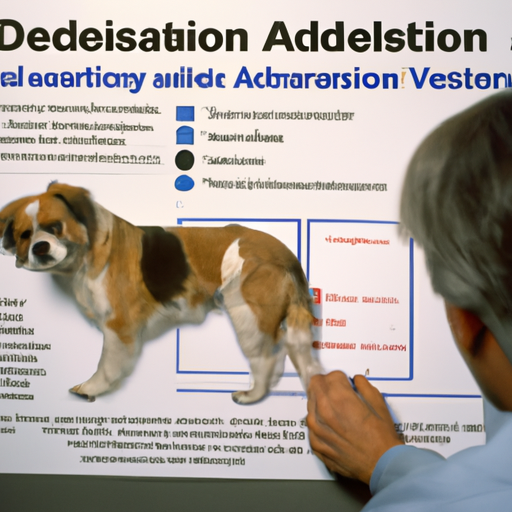Addison’s disease, also known as hypoadrenocorticism, is a rare but serious condition that affects dogs. This disease occurs when a dog’s adrenal glands fail to produce enough hormones, specifically cortisol and aldosterone. These hormones are essential for a dog’s body to function normally. If left untreated, Addison’s disease can have severe consequences, even death. However, with early detection and proper management, dogs with Addison’s disease can lead a normal, healthy life.
Table of Contents
1. Understanding Addison’s Disease
2. Causes of Addison’s Disease in Dogs
3. Symptoms and Diagnosis
4. Treatment and Management
5. Living with Addison’s Disease
6. Frequently Asked Questions
Key Takeaways
– Addison’s disease is a serious, but manageable condition in dogs caused by inadequate hormone production.
– It’s caused by damage to the adrenal glands, which can be due to immune system issues, infections, or certain medications.
– Early detection is crucial for successful management of the disease.
– Treatment typically involves lifelong medication and regular vet check-ups.
– With proper care and management, dogs with Addison’s disease can live a normal, healthy life.
Understanding Addison’s Disease
Addison’s disease is a disorder that occurs when a dog’s adrenal glands fail to produce enough of the hormones cortisol and aldosterone. These hormones are critical for maintaining your dog’s health in various ways. For instance, cortisol helps your dog respond to stress and reduces inflammation, while aldosterone regulates sodium and potassium levels in the body.
Addison’s disease can affect dogs of all breeds and ages, but it is more common in young to middle-aged dogs, female dogs, and certain breeds like the Standard Poodles, Portuguese Water Dogs, and Nova Scotia Duck Tolling Retrievers.
Like any other disease, understanding Addison’s disease is the first step to managing it effectively. There are many online resources available to help you understand this disease better.
Causes of Addison’s Disease in Dogs
Addison’s disease typically occurs when the adrenal glands are damaged, causing a decrease in hormone production. The exact cause of this damage is unknown, but it’s often linked to problems with the immune system.
Some dogs may develop Addison’s disease as a result of taking certain medications, such as steroids, for other health conditions. In these cases, the adrenal glands can shrink, causing a drop in hormone production. It’s important to consult with your vet before changing or discontinuing any medications your dog may be taking.
Symptoms and Diagnosis
The symptoms of Addison’s disease can vary greatly from one dog to another and can be quite subtle, making the disease difficult to diagnose. Common symptoms include lethargy, loss of appetite, vomiting, and weight loss. If your dog shows any of these symptoms, it’s important to take them to the vet as soon as possible.
To diagnose Addison’s disease, your vet will likely conduct a series of tests, including blood tests and urine tests. If these tests indicate Addison’s disease, your vet may then perform an ACTH stimulation test, which is the definitive test for this condition.
You can find more information about the symptoms and diagnosis of Addison’s disease in dogs at this link.
Treatment and Management
While Addison’s disease is a serious condition, it can be managed effectively with proper treatment. Treatment typically involves replacing the hormones that your dog’s body is not producing enough of. This usually means your dog will need to take medication for the rest of their life.
Regular check-ups with your vet are also crucial to ensure your dog’s hormone levels remain balanced, and their condition is being managed effectively.
For more insights on managing your pet’s health condition, Top Dog provides valuable resources about different dog diseases and treatments.
Living with Addison’s Disease
While a diagnosis of Addison’s disease can be scary, remember that with proper treatment and management, your dog can still lead a normal, healthy life. It’s essential to stay in regular contact with your vet and ensure your dog is taking their medication as prescribed.
Remember to keep an eye on your dog’s behavior and symptoms, as changes may indicate a need to adjust their treatment. For more advice on living with a dog with Addison’s disease, click here.
Frequently Asked Questions
-
What is Addison’s disease in dogs?
Addison’s disease is a condition where a dog’s adrenal glands do not produce enough hormones. This can lead to various health issues, including fatigue, weight loss, and gastrointestinal problems. -
What causes Addison’s disease in dogs?
The disease is usually caused by damage to the adrenal glands, which can be due to immune system issues, infections, or certain medications. -
Can Addison’s disease in dogs be cured?
While there is currently no cure for Addison’s disease, it can be managed effectively with medication and regular vet check-ups. -
Is Addison’s disease in dogs life-threatening?
If left untreated, Addison’s disease can be life-threatening. However, with early detection and proper treatment, dogs with this condition can lead a normal, healthy life.
In conclusion, while Addison’s disease is a serious condition, it’s important to remember that with the right care and treatment, your dog can continue to live a happy, healthy life. Regular vet check-ups, proper medication, and a watchful eye are key to managing this disease effectively. For more information on how to care for your dog, check out One Top Dog’s blog.



